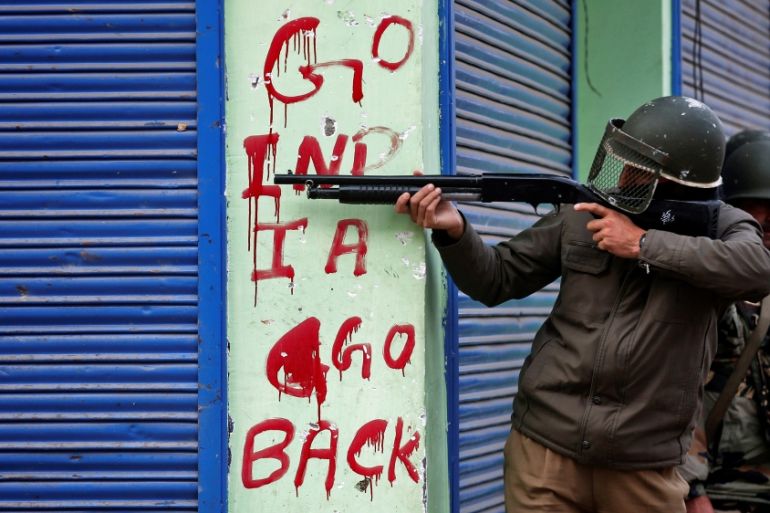Opposition seeks clarity on Norwegian ‘mediation’ in Kashmir
Opposition parties ask Modi government to explain ex-Norway PM’s surprise Kashmir trip during which he met separatists.

A recent visit by a former Norwegian prime minister to Indian-administered Kashmir, where he met separatist leaders, has sparked a controversy, with opposition parties questioning the government over the surprise trip.
Omar Abdullah, the leader of regional party National Conference (NC), pointed fingers at the Hindu nationalist government of Prime Minister Narendra Modi to explain the closed-door meetings held in Srinagar, the main city in the region.
“What are the Norwegians up to in Kashmir? Would either (External Affairs Minister) @SushmaSwaraj ji or (National Security Advisor Ajit) Doval ji care to put the visit of the former Norwegian PM to both sides of the divided state in the correct context or do we have to rely on rumours & conjecture?” Abdullah tweeted.
There is a complete vacuum in Kashmir at the moment. Hence this uncoordinated step that is filling that vacuum
Kjell Mangne Bondevik, the longest-serving former prime minister of Norway, met separatist Kashmiri leaders Syed Ali Shah Geelani and Mirwaiz Umar Farooq on Friday.
The disputed region, which has witnessed widespread unrest in the past few years, was brought under New Delhi’s direct rule earlier this year. Last week, the Indian government dissolved the state assembly – a move criticised by the opposition parties.
Bondevik’s trip to Kashmir was the first by a foreign dignitary since Modi took power in 2014 and came months after the United Nations urged an international inquiry into human rights violations in the Muslim-majority region by Indian security forces.
He later travelled to Pakistan-administered Kashmir where he held talks with a cross-section of people.
Bondevik serves as the Executive Chair at the Norway-based Oslo Center that claims to “promote peace and human rights”. He had mediated between the Sri Lankan government and the Tamil fighters during the civil war.
![Bondevik met Syed Ali Shah Geelani, left, and Mirwaiz Umar Farooq, right, in Srinagar [File: Danish Ismail/Reuters]](/wp-content/uploads/2018/11/ce7d3b27f84349e48688ec475de7208f_18.jpeg)
In August 2014, New Delhi cancelled scheduled talks with Islamabad after the then Pakistani ambassador to India met Kashmiri separatists in New Delhi.
‘We want clarity’
A spokesperson at the Norwegian embassy in New Delhi distanced itself from the visit on Tuesday.
“The embassy had no knowledge of this trip and we have nothing to do with Bondevik’s meeting,” an embassy official, who did not want to be named, told Al Jazeera.
India’s foreign ministry is yet to clarify whether Bondevik’s visit to Kashmir on both sides of the border is a “mediation” attempt backed by the Indian government.
“We want clarity on what exactly is happening. We are a votary of dialogue between India and Pakistan,” Tanvir Sadiq, political adviser to the former chief minister of Jammu and Kashmir state Omar Abdullah, told Al Jazeera.
“If anything breaks the ice, it would be a welcome step. But we need to know if the government in New Delhi is backing these meetings,” he said.
“Modi claimed he was the strongest prime minister in recent times. We were expecting some out-of-the-box ideas from him. The situation here has gone from bad to worse. Even to go back to a relatively peaceful situation like that existed in 2014 would be a herculean task,” he added.
The ruling right-wing Bharatiya Janata Party (BJP) party is opposed to any “foreign interference” in the Kashmir dispute and had announced a so-called “muscular” approach to the crisis since it assumed power in 2014.
Sheikh Ashiq, who was part of the delegation of local industrialists in Srinagar, which met Bondevik on Friday, told Al Jazeera “everyone wants an end to the bloodshed”.
“We were invited on a short notice. It was surprising. He wanted to know about the ground situation and we told him about it. We thought let’s not lose this opportunity. There is a growing loss of human lives. We definitely want an end to it,” he said.
Kashmir has seen a record number of fatalities since January with over 400 people killed, including 145 civilians – the highest since 2009.
‘Positive development’
New Delhi and Islamabad have staked claim over the disputed territory since the two countries won independence from British colonial rulers in 1947. They have fought two wars over the disputed territory.
On Friday, Mirwaiz Umar Farooq, a member of Hurriyat, Kashmir’s main separatist alliance, tweeted photos of their meeting with the Norwegian leader. Hurriyat is an umbrella group of political and religious groups fighting for Kashmir’s secession from India.
“Whenever international interest is evoked in our conflict it is a welcome move. Norway has a history of facilitating conflict resolutions across the globe. So meeting their former prime minister in this regard is a positive development and we hope things move forward,” Farooq told Al Jazeera.
The move also angered some within the ruling BJP, with party MP Subramanian Swamy hitting out at the government for allowing “gross interference” by the former Norwegian prime minister.
Calls to the BJP spokespersons for a response went unanswered.
The BJP has long favoured a hardline approach to quell the armed revolt in Kashmir that has claimed more than 70,000 lives, most of them civilians.
India’s foreign ministry maintains that “there are only two stakeholders on the issue of Jammu and Kashmir – India and Pakistan, none else”.
“It’s further evidence of a lack of a Kashmir policy on the part of the government. If they had a coherent Kashmir policy, the Indian government would be in a dialogue with the separatist leaders themselves,” defence and security analyst Ajai Shukla told Al Jazeera.
“The government is unable to bring the Hurriyat to the table. There is a complete vacuum in Kashmir at the moment. Hence this uncoordinated step that is filling that vacuum.”
Additional reporting by Rifat Fareed from Srinagar